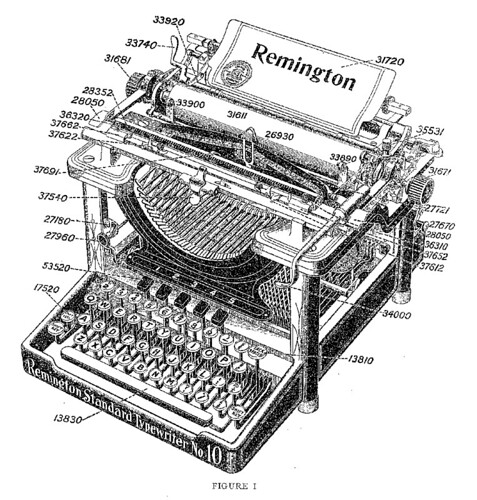Those are the sounds a good old-fashioned typewriter makes after a feverish night of typing done by the literary wordsmith writing the Great American Novel or the muckraking journalist exposing the local mayor for corruption charges. In what is virtually a bygone era replaced by the personal computer, we here at the Libraries felt it fitting to revisit an old friend.
 It was in 1714 that Queen Anne of Great Britain issued a patent for a "writing machine," conjuring up a dream of "[a]n artificial machine or method for the impressing or transcribing of letters, singly or progressively, one after another as in writing, whereby all writings whatsoever may be embossed on paper or parchment so neat and exact as not to be distinguished from print."
It was in 1714 that Queen Anne of Great Britain issued a patent for a "writing machine," conjuring up a dream of "[a]n artificial machine or method for the impressing or transcribing of letters, singly or progressively, one after another as in writing, whereby all writings whatsoever may be embossed on paper or parchment so neat and exact as not to be distinguished from print."
It would take more than a century to realize this dream, with many patents issued in Europe and America, although none made it into commercial production. A patent was granted finally in 1866 to Christopher Latham Sholes of Milwaukee, Wisconsin. This led to an agreement with the E. Remington and Sons company to commercialize the machine and begin production in 1873. The rest, as they say, is typewriter history! There would be later innovations, of course (with electric typewriters and models promising "noiseless" typewriters), but the core functions remained the same.
If you want to learn more about the typewriter, the Libraries has extensive coverage of this technological marvel. A brief history of the typewriter is a good place to start. An extensive amount of trade literature is also available on various typewriter companies (including Remington) to peruse at the National Museum of American History Library. Just make sure to change your ribbon before typing up a storm!—Brett Lambert
Happy Labor Day from Smithsonian Libraries!
Above: Collage of various promotional materials for the Remington typewriter

Above: Remington Typewriter from 1908.

One Comment
Having spent years and years in many office environments, I’ve observed the transition fom typewriters to PCs (I’m old). Living in office cubicles for many of those years, I learned to love my PC. It frees you from the need to go back and forth with the office typists. On the other hand, nowadays, most office workers are expected to do their own typing.